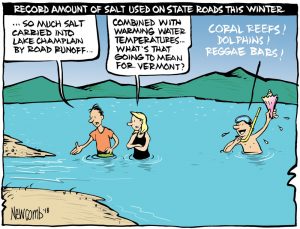The Vermont Smart Water Initiative
The Problem

Poor water quality leads to less tourism dollars coming into the state
Vermont would lose $16.8 million in economic activity and 200 full time jobs – in July and August alone – for every one-meter decrease in water clarity.
A one-meter drop in water clarity also would lead to a 37% depreciation for seasonal homes, and a three percent loss for year-round single family homes.
Lake Champlain is becoming salty – chloride in Lake Champlain was measured in 2017 to be 11.528 milligrams per liter, whereas the vast majority of lakes in Vermont and northern New York came in at under 1 milligram per liter. This is resulting from winter snow removal practices.
Cyanobacteria outbreaks lead to beach closures because swimming in the water during a harmful algae bloom can lead to exposure to hepatotoxins, neurodegeneration, neurotoxins, general cytotoxin (multiple organ systems affected), dermal toxins, and gastro-intestinal toxins.
Accelerating the Solution
The Vermont Smart Water Initiative vision is to demonstrate and communicate how emerging Internet-of-Things technologies can help entities better manage clean water resources by enabling cost-effective smart city and precision agricultural implementation.
This vision will be implemented through both theory and application so we can best learn as a community. Distinguished speakers will be invited to Burlington to speak as part of a Smart City Industry Panel focused on protecting water resources for theory. The application is a group of tech events call ‘App Nights’ organized by passionate IoT Conduit professional partners with financial backing from IoT Conduit Members and interested community stakeholder sponsors.
2020 Industry Panel => Smart Cities – How Not to Reinvent the Wheel
The Smart City Industry Panel will be made up of 4 of the top water scientists and technologist, moderated by water expert AJ Rossman and titled ‘Smart Cities – How Not to Reinvent the Wheel’. This panel of doers will detail successes, teach by evaluating failures, and will address the following questions:
- How does a smart city affect you?
- What is out there and what have we learned?
- How does information get validated and shared?